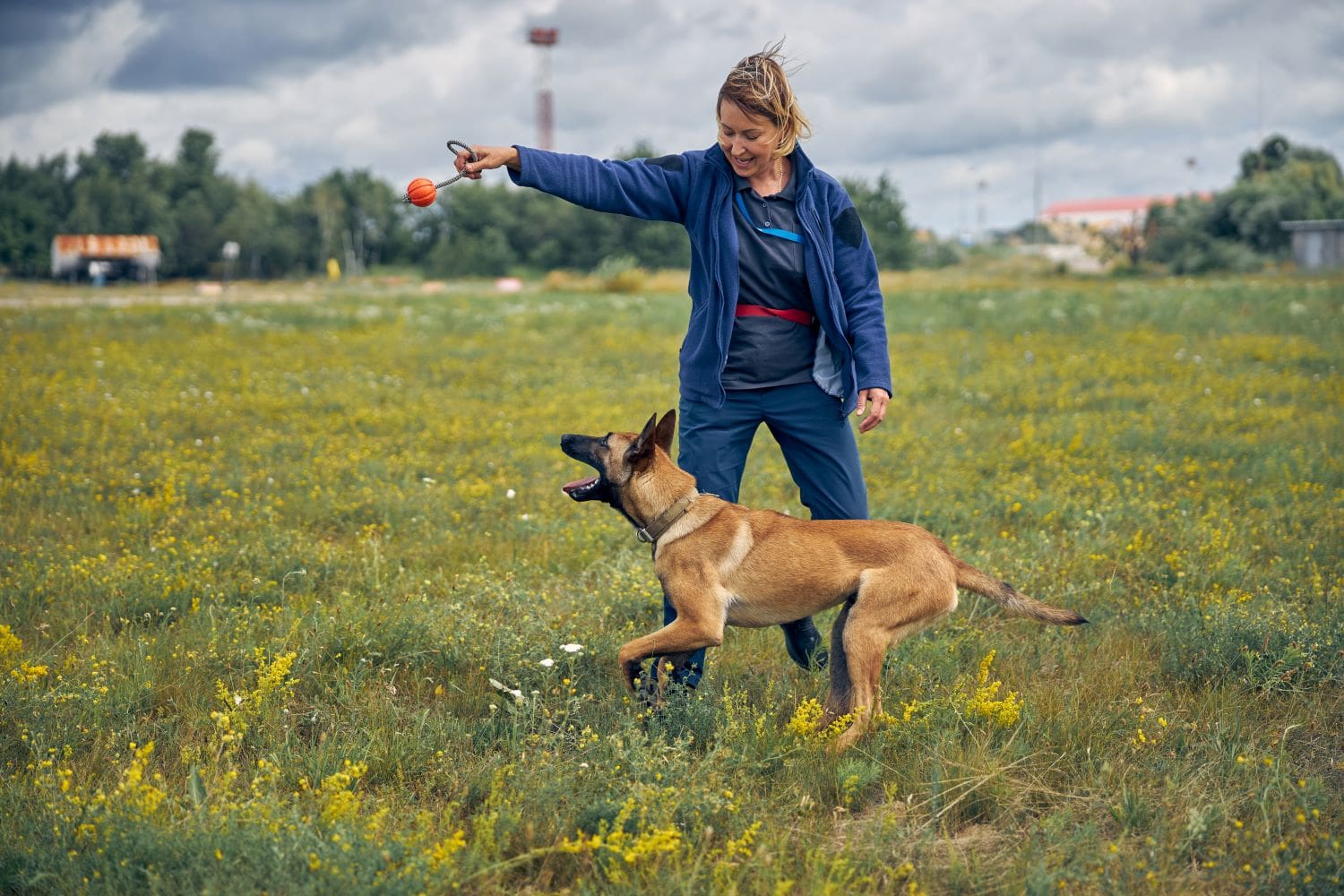How to become a Dog Trainer
Everything you need to know about becoming a Dog Trainer in 2025
Are you passionate about dogs and eager to turn that passion into a rewarding career? Becoming a dog trainer might be the perfect path for you. In today’s world, where pet ownership is at an all-time high, the demand for skilled dog trainers is rapidly growing. Not only does this profession allow you to work closely with our beloved canine companions, but it also offers the chance to make a real difference in their lives and the lives of their owners.
Embarking on this journey requires dedication, patience, and a genuine love for animals. But don’t worry – you’re not alone! There are numerous resources available to guide you through every step of becoming a successful dog trainer. From understanding canine behaviour and mastering training techniques to building your own business, each aspect of this career can be incredibly fulfilling.
In this career guide, we’ll explore everything you need to know about starting your journey as a dog trainer. Whether you’re looking to train service dogs or help pet owners manage behavioural issues, we’ll provide valuable insights and practical tips that will set you on the path to success. So grab your lead and treats – let’s get started on transforming your passion into expertise!
In this Dog Trainer career guide
What does a Dog Trainer do?
A dog trainer plays a crucial role in shaping the behaviour and obedience of our beloved canine companions. They are not just about teaching dogs to sit or stay; they delve much deeper into understanding the unique needs and personalities of each dog. By employing a range of techniques, both traditional and modern, dog trainers work to build a strong bond between dogs and their owners.
One of the primary tasks of a dog trainer is to assess the dog’s behaviour and identify any issues that need addressing. Whether it’s excessive barking, aggression, or anxiety, trainers have the expertise to pinpoint these problems and develop tailored training programmes. These programmes often include positive reinforcement methods that encourage good behaviour through rewards.
Moreover, dog trainers educate owners on how to communicate effectively with their pets. This involves teaching them about body language cues, tone of voice, and consistent commands – ensuring that training continues at home beyond structured sessions.
In addition to behavioural training, many dog trainers also offer specialised services such as agility training or preparation for competitive events. These activities not only enhance physical fitness but also provide mental stimulation for dogs.
Ultimately, investing in a professional dog trainer can lead to a more harmonious household where both you and your furry friend thrive together. With their guidance, you can transform challenging behaviours into positive experiences – making life with your pet all the more rewarding.
Responsibilities of a Dog Trainer
Becoming a dog trainer is not just about teaching dogs to sit and stay; it’s a multifaceted role that requires patience, dedication, and a deep understanding of canine behaviour. Here are some key responsibilities that every effective dog trainer must embrace:
Assessing Behaviour: Before any training can commence, it’s crucial to evaluate the dog’s current behaviour. Understanding the dog’s temperament and any behavioural issues is essential for tailoring an appropriate training plan.
Developing Training Plans: Each dog is unique, so trainers must create customised training programmes that cater to individual needs. This involves setting realistic goals and choosing suitable techniques that align with both the dog’s personality and the owner’s expectations.
Educating Owners: A significant part of a dog trainer’s job is educating owners on how to reinforce positive behaviours at home. Trainers provide guidance on consistency in commands and rewards, ensuring owners are well-equipped to continue training beyond sessions.
Teaching Basic Commands: From “sit” to “stay” and everything in between, trainers teach dogs basic commands essential for good manners both at home and in public settings.
Addressing Behavioural Issues: Whether it’s excessive barking or separation anxiety, trainers work diligently to address various behavioural problems through specialised techniques designed to modify unwanted behaviours effectively.
Ensuring Safety: Safety is paramount during all interactions with dogs. Trainers must ensure that both they and their canine clients remain safe throughout the training process by using humane methods and maintaining control over potentially unpredictable situations.
Providing Progress Reports: Regular communication with pet owners about their dog’s progress helps keep everyone aligned on goals while also celebrating milestones achieved along the way.
By fulfilling these responsibilities with care and expertise, dog trainers play an invaluable role in fostering harmonious relationships between pets and their owners, ultimately leading to happier homes for everyone involved.

Skills needed to become a Dog Trainer
Becoming a successful dog trainer requires a unique blend of skills and attributes. If you’re considering this rewarding career path, here are some essential skills you’ll need to master:
Patience: Training dogs can be a slow process, requiring you to remain calm and composed even when progress seems minimal. Patience is key in building trust and understanding with both dogs and their owners.
Communication: Effective communication is crucial, not only with the dogs but also with their owners. You must be able to convey instructions clearly and ensure that pet owners understand how to continue training at home.
Empathy: Understanding the emotions and behaviours of different breeds is essential in tailoring your approach to each individual dog. Empathy allows you to connect on a deeper level, making training more effective.
Problem-Solving Skills: Each dog presents unique challenges that require creative solutions. Being able to think on your feet and adapt your methods is vital for overcoming obstacles during training sessions.
Keen Observation: A good trainer must notice subtle changes in behaviour or mood, which can indicate how well a dog is responding to training or if adjustments are needed.
Physical Stamina: Training can be physically demanding, involving long hours on your feet and active engagement with energetic dogs.
Knowledge of Canine Behaviour: A strong understanding of canine psychology helps you anticipate reactions and tailor your training techniques accordingly.
Teaching Skills: As much as you’ll train the dogs, you’ll also need to educate their owners on maintaining progress at home; hence teaching skills are invaluable.
By honing these skills, aspiring dog trainers can build successful careers while making positive impacts in the lives of both dogs and their human companions.
What qualifications do Dog Trainer’s need?
When considering a career as a dog trainer, it’s important to understand the qualifications that can set you apart in this rewarding field. While formal education isn’t always mandatory, possessing certain credentials can significantly enhance your credibility and effectiveness.
Firstly, enrolling in a recognised dog training course or programme is highly beneficial. These courses often provide comprehensive knowledge of canine behaviour, learning theories, and practical training techniques. By gaining certification from reputable organisations such as the Association of Pet Dog Trainers (APDT) or the Institute of Modern Dog Trainers (IMDT), you demonstrate your commitment to professional standards and ongoing education.
Moreover, hands-on experience is invaluable. Volunteering at animal shelters or working alongside experienced trainers allows you to apply theoretical knowledge in real-world settings, honing your skills in handling various breeds and temperaments.
Finally, possessing excellent communication skills is crucial for success. As a trainer, you’ll need to effectively convey instructions not only to dogs but also to their owners. Building rapport with clients fosters trust and ensures that they can confidently implement your guidance at home.
In conclusion, while formal qualifications are not strictly necessary to become a dog trainer in the UK, pursuing relevant certifications and gaining practical experience are key steps towards establishing yourself as a knowledgeable and trustworthy professional in the field.
Work environment and hours
For those considering a career as a dog trainer, understanding the work environment and hours is crucial to making an informed decision. Dog trainers often find themselves working in a variety of settings, from bustling training centres and serene outdoor parks to clients’ homes. This diversity offers a dynamic work environment that keeps each day fresh and engaging.
The hours of a dog trainer can be quite flexible but often require evening or weekend availability to accommodate clients’ schedules. Many trainers appreciate this flexibility as it allows them to tailor their work-life balance according to personal preferences. However, it’s important to note that while the flexibility is appealing, it also demands dedication and self-discipline.
In addition, the role requires physical stamina and patience, as working with dogs involves both active participation in training sessions and managing different canine temperaments. For those passionate about animals and helping people build better relationships with their pets, this career path can be incredibly rewarding despite its demands.
Overall, if you’re someone who thrives in varied environments and values flexibility in your work schedule, becoming a dog trainer could be an ideal choice for you. The opportunity to make a tangible difference in both dogs’ lives and their owners’ experiences makes every challenge worthwhile.

How much do Dog Trainer’s earn?
Dog training is not only a rewarding career for those passionate about animals, but it can also be financially lucrative. On average, dog trainers in the UK can expect to earn between £20,000 and £30,000 per year. However, this figure can vary significantly based on experience, location, and specialisation.
For instance, trainers who offer specialised services such as behaviour modification or work with service dogs often command higher fees. Additionally, experienced trainers who establish their own businesses or offer private sessions have the potential to earn upwards of £40,000 annually.
Location plays a crucial role in determining earnings as well. Trainers operating in urban areas like London or Manchester typically charge more due to higher demand and cost of living. Furthermore, building a strong reputation through successful client outcomes and positive word-of-mouth can lead to increased rates and more clients.
Ultimately, while starting salaries might be modest for new entrants into the field, there is ample opportunity for growth both professionally and financially for dedicated dog trainers willing to invest time in honing their craft and expanding their client base.
Types of roles for Dog Trainer’s
Dog training is a rewarding career that offers a variety of roles to suit different interests and skills. Whether you’re passionate about obedience training, behaviour modification, or even canine sports, there’s a niche for you in this dynamic field.
One popular role is that of an obedience trainer. These professionals focus on teaching dogs basic commands and manners, ensuring they are well-behaved companions. It’s an ideal path if you enjoy working with pet owners to improve their dog’s everyday conduct.
For those interested in more specialised work, becoming a behaviourist might be the perfect fit. Behaviourists tackle complex issues such as aggression or anxiety, working closely with both the dog and owner to develop tailored strategies for improvement. This role requires patience and a deep understanding of canine psychology.
If you’re looking for something more adventurous, consider exploring the world of canine sports training. From agility to flyball, these trainers prepare dogs for competitive events, combining discipline with fun activities that strengthen the bond between dog and handler.
Additionally, assistance dog trainers play a crucial role in society by preparing dogs to support individuals with disabilities. This highly rewarding career involves rigorous training processes but offers immense satisfaction knowing your work significantly enhances someone’s quality of life.
With such diverse opportunities available within dog training roles, aspiring trainers can find their perfect match by considering what aspects of working with dogs excite them most. Each path offers unique challenges and rewards but ultimately contributes to fostering better relationships between humans and their four-legged friends.

Professional Development and Career Paths
Embarking on a career as a dog trainer is not just about a love for dogs; it’s an opportunity to shape rewarding and varied professional paths. With the pet industry booming, there’s never been a better time to explore the diverse avenues available in this field. From working one-on-one with clients to training service dogs, the potential for growth and specialisation is vast.
Investing in professional development is key to unlocking these opportunities. Pursuing certifications from recognised organisations can significantly enhance your credentials, making you more attractive to potential employers or clients. Courses in animal behaviour, psychology, and advanced training techniques can provide invaluable skills that set you apart from the competition.
Moreover, networking within the community of dog trainers opens doors to mentorships and collaborations that can propel your career forward. Whether you aspire to open your own training facility or become a specialist in behavioural issues, staying informed about industry trends and continuously honing your skills will ensure that you remain at the forefront of this dynamic profession.
In essence, by committing to ongoing learning and exploring various niches within dog training, you’ll not only advance your career but also enrich the lives of countless dogs and their owners along the way.



